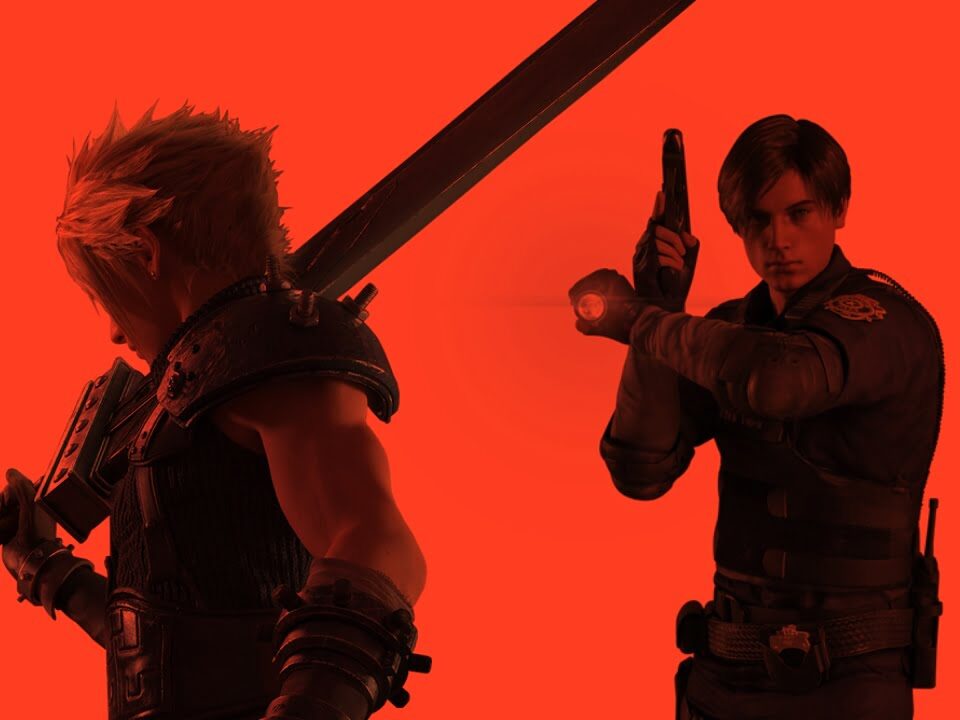How the Resident Evil 2 remake has soared, while the Final Fantasy VII remake has faltered.
Both Final Fantasy VII and Resident Evil 2 were released for the original PlayStation, in 1997 and 1998 respectively. They were both key releases under a huge amount of pressure. Final Fantasy VII had to follow the best J-RPG the world had yet seen, Final Fantasy VI, while Resident Evil 2 was literally the difficult second album after a surprise, breakthrough smash.
They were both enormous successes, cementing the future of both their series as a whole and of their respective publishing houses.
It’s no surprise, then, that 20 years down the line, we’re starting to see remakes for these remarkable video games. What is a little surprising, however, is the manner in which we are seeing them.
Final Fantasy VII
The Final Fantasy VII remake was announced with much fanfare at E3 2015, following the underwhelming HD re-release announcement from Sony’s PlayStation Experience event in December 2014. The audience reaction – or rather, lack of – from two minutes in that video is hilarious. We then saw a trailer for the game at December 2015’s PlayStation Experience, that showcased the remake’s interpretation of the original game’s opening mission and tutorial, the first reactor bombing.
People were excited. While obviously there are some significant changes to the game as a whole, it looked, for the most part, just like the Final Fantasy VII they remember.
Since then, while screenshots and footage and other information has been drip-fed on an infrequent basis, concrete details on the Final Fantasy VII remake have been scarce. We know that the game uses Unreal Engine 4, rather than the in-house engine used for Final Fantasy XV. We’ve heard that the game is going to be released in episodes; a modern take on the original’s three-disc arrangement. We’ve also heard that they are recruiting for the project, which at least tends to confirm it’s not dead in the water.
But we still don’t know when it’s going to be released. We certainly haven’t been allowed anywhere near a playable build.
Compare that with the cycle around the announcement and subsequent release of the Resident Evil 2 remake, and it paints a very different picture.
Resident Evil 2
The Resident Evil 2 remake was also confirmed to be in development in 2015, after the original game’s director, Hideki Kamiya, had allegedly badgered Capcom to do it for years. Then the trail went cold almost instantly. We heard nothing about the game for three whole years. Most people probably even forgot that it was happening. We certainly did.
Fast-forward three years to E3 2018, and suddenly, the Resident Evil 2 remake was front and centre. First, Sony dropped a trailer during its PlayStation showcase event.
Then E3 itself opened, and Resident Evil 2 had an enormous presence. There was a ruined Raccoon City Police Department building; a crashed squad car and zombie actors people could have their photo taken with; and, most importantly, a playable demo. After Marvel’s Spider-Man, the Resi 2 stand probably had some of the most consistently bulging queues of the whole event (along with Kingdom Hearts 3 and Super Smash Bros. Ultimate).
Variants of that demo then toured the rest of the events in gaming’s calendar – Gamescom, PAX, EGX – before a brilliant, time-restricted version landed in our homes a couple of weeks ago. Now, just seven months after making such a big splash at E3 2018, the game releases in a couple of days. Both the early reviews (ours is still in the works) and fan hype are peaking at just the right moment, to conjure up something of a perfect storm for Resi 2. In a release schedule that also includes Metro Exodus, BioWare’s Anthem, a new Far Cry game, and the aforementioned Kingdom Hearts 3? That’s quite an achievement.
The Resident Evil 2 remake is a masterclass in video game release management and PR, and congratulations are in order to the team at Capcom. Final Fantasy VII’s remake is, by comparison, a PR disaster. Why is that?
1. Size
It’s fair to say that Final Fantasy VII is significantly larger than Resident Evil 2. To rush through the former would take you 30 hours; the latter could be done in under eight. To give the originals your full care and attention, to discover every area and unlock every secret, might take you over 100 hours in Final Fantasy VII. In Resident Evil 2, you’d be looking at no more than 15 or 16 hours.
It’s evidently going to take more time to produce a hand-built remake of a 100-hour game than a 16-hour one. That’s a bit of a given. But as a coefficient of the ground-up remake, Resident Evil 2 has become significantly longer. Between better animation, longer cut-scenes, and some changes to the flow of the game, that basic story run has jumped from eight to 20 hours.
That still doesn’t make it the same length as Final Fantasy VII’s overall story, but consider something else we know about that remake: it’s going to be released in episodes. When you look at it that way, it’s more reasonable to expect that a single episode could be similar in length to the Resident Evil 2 remake, yet we’ve still not even seen a release date for the first episode of Final Fantasy VII.
2. Scope
It’s also fair to say that the scope of Final Fantasy VII is larger than Resident Evil 2. That’s not a knock on the survival horror masterpiece, but it’s always going to take longer to produce a massive, semi-open world than it is to build the confined spaces of a police station, a sewer, and other Raccoon City locales.
Let’s also consider for a moment a third ground-up remake when we talk about scope: Shadow of the Colossus. That’s an entire technical overhaul, sure, but it’s effectively a 1:1, shot-for-shot remake of the original. To do anything else would, quite frankly, be sacrilege.
So if on one end of the remake scale you’ve got the pre-ordained, shot-for-shot update of Shadow of the Colossus, the Final Fantasy VII remake is most definitely at the other extreme. To go from Gouraud-shaded, polygonal homunculi to photo-realistic characters is one thing, but to move away from those hand-painted, pre-rendered static backdrops is another challenge entirely. It’s the difference between an old-timey frontier town attraction – complete with false-front, plywood buildings and animatronic cowboys – and actually building Westworld.
The Resident Evil 2 remake sits somewhere between these two extremes. Gone are the static camera angles and pre-rendered environments (and the awful tank controls), replaced instead with Resident Evil 4’s mechanics in Resident Evil 7’s engine. That’s not to throw any shade on the ambition or craft of the team behind this stellar remake, of course, but the framework they were building to – of claustrophobic corridors and tight, interior spaces – is more manageable than Final Fantasy VII’s sprawling behemoth of a world.
And, credit where it’s due, Capcom has done a remarkable job of bringing those spaces to life with remarkable levels of detail and panache.
3. Project management and communication
Size and scope are always going to be of concern when you’re developing a remake, but it’s how the projects have been handled that really highlights the difference between success and failure.
Life lesson time: There is immeasurable wisdom in not showing your hand until you are absolutely certain of the relative value of cards you hold. This is true in most walks of life (including, erm, playing cards) but is especially apt when you’re attempting to straddle the fine line between the creative and commercial aspects of a project.
To a certain extent, it depends on your size and budget. If you’re an indie developer you’re never going to be able to spend tens of thousands on big bang marketing campaigns, so in that context, building your audience up at a trickle through social media and constant updates is a workable strategy. But in this instance, where we frankly have no concerns about the budgets of either game or publisher, it’s fair to say that Resident Evil 2’s big bang approach has trounced Final Fantasy VII’s drip, drip tactics.
Nothing was shown about Resident Evil 2 until the product was close to being ready, and an expo demo build was available. It made the game feel tangible. Imminent. Important.
Contrast that to the Final Fantasy VII remake, though, and it’s almost starting to look like vapourware. Where have we seen that before? Oh, yes, Final Fantasy XV – which began life as Final Fantasy XIII-2 – was in development for over 10 years, and we wondered if it would ever be finished. Kingdom Hearts 3 has been in development (or perhaps more likely, Disney licensing) hell since sometime in the previous decade.
Even more interesting is that the Final Fantasy VII remake’s director, Tetsuya Nomura, has also been directing Kingdom Hearts 3, and has been splitting his time between the projects. Now the latter is almost upon us, that should free up budget and resources to put focus back onto the remake. Just don’t be surprised when that has a further knock-on effect on the as-yet-unannounced Final Fantasy XVI.
So where does that leave us?
For now, we know that the Resident Evil 2 remake is finished, it’s really good, and you’ll all get to play it very soon.
As for the Final Fantasy VII remake? We literally have no idea, but it would have been better for all concerned if it had been kept under wraps until it was a lot closer to completion.






